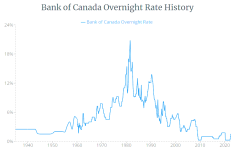What is normal, though? It's like we have collective amnesia about the '80s.
Good luck picking a 'normal' off this chart. Aside from the nuttiness of the '80s, 1990 saw 13.5% and 2007 was 4.5%. We're barely over 2019 rates now. It's hardly impossible things get up to 6%+ in the relatively near future, and not planning for it is crazy.
View attachment 56441
The BoC isn't raising rates to lower housing prices. They've historically been terrified, and with good reason, about collapsing what may be a house of cards. But between inflation and keeping things in line with the US to ensure stable currency exchange (critical for export trade to the US in particular), they don't have much choice now. Global events have finally forced their hand.
I think the much bigger error was dumping fuel on the fire by leaving the rates so low for so long during the pandemic. Once it became clear in mid-2020 that the super low rates were only overheating the housing market, rates should have come back up fast. Instead, they let them sit for a year and a half, during which Canadians bought massively overinflated houses and racked up HELOCs, digging the hole so much deeper. Hindsight is 20/20, I know...
The other factor that few talk about in the inflation panic is that while it looks awful year-on-year, it doesn't account for the year of very low inflation in 2020. Averaged over two years, the inflation numbers don't look so horrific. Also, looking at historical trend lines, GTA house prices dropping 30-40% would only put us back on pace to match where they would have been had things not gotten so overheated over the past decade...


















